
To celebrate our 100th article we asked some of Money King NZ’s followers to ask us any questions they had about investing. Here’s our answers.
The answers in this article have been provided without any knowledge or consideration of the personal circumstances of the person who asked the question. This content should not be taken as financial advice.
1. What do you look for in companies and funds that will show you it’s a good investment?
Here’s a quick overview of what we’d look for in different types of investments:
Index funds
- Total cost of ownership – Does this fund have low fees? This includes management fees, brokerage costs, FX fees, and taxes.
- The index it tracks – What industries and countries is the fund exposed to? What criteria does the index use to select companies for inclusion?
- Constituents – What companies does the fund actually invest in? Do they align with your investment goals and ethical views?
- Tracking differences – How well does the fund tracks its index? This can be calculated by comparing the fund’s performance with the performance of the index.
Actively managed funds
- Past performance – Does this fund have a long-term track record of outperforming the market? This doesn’t necessarily mean it will perform well into the future, but can give you an indication of whether the fees the fund has charged have been worth it.
- Investment strategy – What’s the objective of the fund? Are they trying to beat the market, or deliver a certain percentage return each year? What strategies does the fund manager use to meet that objective, and do they align with your risk tolerance and investment goals?
- Underlying investments – What asset classes/companies does the fund invest in? Do they align with your investment goals and ethical views?
Companies
- The business – Is it an attractive business you’d like to own? For example, do they have a great product, business model, and management team?
- Growth opportunities – What are their opportunities to grow? Do they face any risks, and can they mitigate those risks?
- Financials – Are their financial metrics (e.g. PE Ratio, Return on Equity, Dividend Payout Ratio) favourable compared to other companies in the same industry?
Buy into a company because you want to own it, not because you want the stock to go up.
Warren Buffett
Note that no amount of research will guarantee that an investment will turn out to be a good one, and that it’ll perform well. So it’s still important to be diversified and invest according to your time horizon and risk tolerance!
Further Reading:
– Due diligence on shares – How I evaluate companies before investing
2. How much does it cost to get an accountant to help with taxes related to assets?
Accountants will typically charge you based on time. A simple tax return might cost you a few hundred dollars, while a complex job where they need to spend time gathering information on your portfolio and trades will cost a lot more. So it’s best to talk to one to get a better gauge on how much it’ll cost for the specific things you need help with.
They’re not the cheapest professionals to hire, so it’ll probably help to keep good records, or use apps like Sharesight (a comprehensive portfolio tracking app with tax reporting) and Koinly (a cryptocurrency specific tax reporting app). This will save your accountant a lot of time (and you a lot of money) if they have access to the right records and reports in relation to your investments.
Further Reading:
– What taxes do you need to pay on your investments in New Zealand?
3. Staking various crypto in NZ?
Staking involves locking up your cryptocurrency in order to facilitate the operation of a cryptocurrency’s network (by verifying transactions). You’ll earn staking rewards in return, which will vary depending on the crypto you stake. Only cryptocurrencies that use the Proof of Stake mechanism to validate transactions (like Cardano, Solana, Polkadot, and Tezos) can be staked.
There’s not really a NZ specific way to stake crypto given cryptocurrencies and their blockchains are borderless. But this is probably the easiest way to stake your coins:
- Buy a stakeable cryptocurrency from a platform like Easy Crypto
- Have that cryptocurrency sent to a wallet that supports staking like Exodus
- Stake your coins (ensure you check the rules around staking that crypto including how to get your money out, how long you have to stake for, and risks)
- Earn your staking rewards
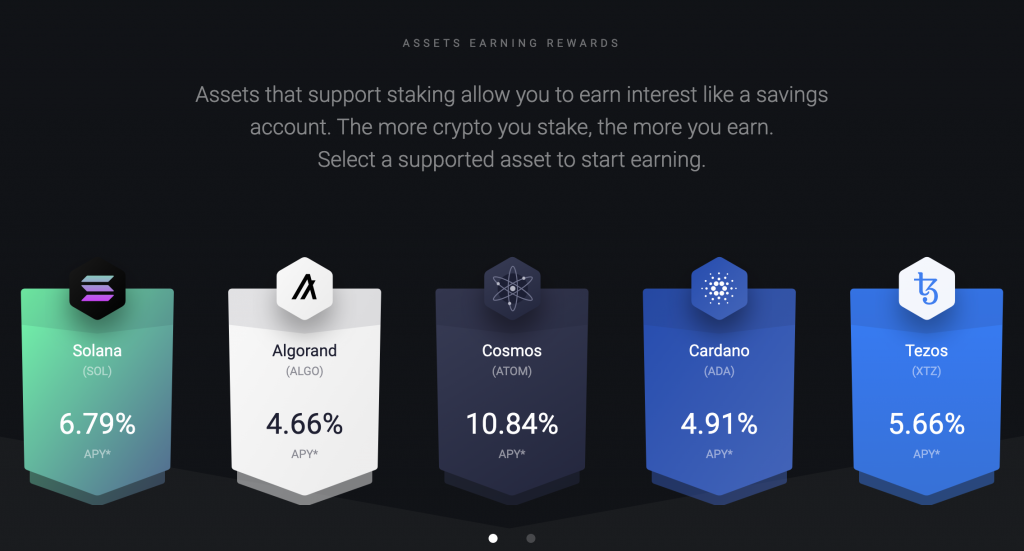
Staking is often confused with cryptocurrency lending, which involves depositing your crypto into centralised platforms like Crypto.com or Celsius and earning interest in return (with the interest ultimately coming from people who borrow money off those platforms). Even non-stakeable coins like Bitcoin or USDT can be lent through these platforms. The interest rates can be high compared with traditional bank deposits, but is likely to be less stable and regulated than the banks.
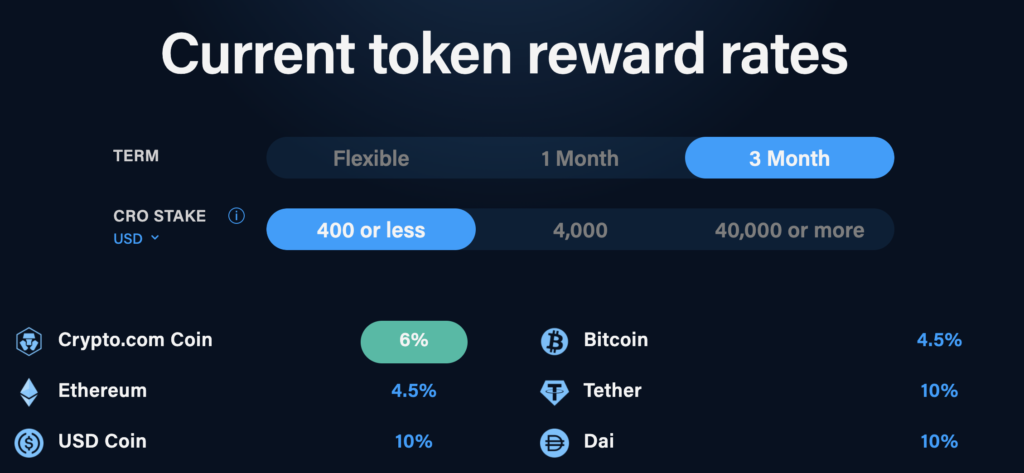
Further Reading:
– Cryptocurrency 101 – Is it investing or gambling?
4. How important is it to own shares with a CSN vs through Sharesies?
Broadly speaking there’s two ways NZX listed shares can be held:
- Under a CSN (Common Shareholder Number) – Your shares are registered under your own name on a company’s share registry. This will be the case if you buy your NZX listed shares via ASB Securities or Jarden Direct.
- Through a custodian – Shares are registered under the name of a custodian, though you remain the beneficial owner of them. This will be the case if you buy your NZX listed shares via Sharesies.
The importance of holding shares under your CSN comes down to personal preference. By holding shares through a custodian you still get the main economic benefits of being a shareholder – any capital gains and dividends are yours, and you’ll also be able to participate in any capital raises or rights issues your companies undertake. Custody arrangements are also safe as your investments are held under an entity that’s separate from the platform itself.
However, there’s a few potential downsides when holding shares through a custodian:
- No ability to opt-in to a company’s Dividend Reinvestment Plan. This is where some companies allow investors to automatically reinvest their dividends into more shares of that company, brokerage-free and often at a discounted price.
- Limited ability to vote. Sharesies does allow you to vote on company issues, but only if they deem that issue important enough.
- No invites to company Annual General Meetings.
- Some companies may offer special shareholder benefits. For example, Restaurant Brands gives their shareholders a KFC voucher every year. This isn’t available when holding shares through a custodian.
- In Sharesies’ case, their custodian is owned, operated, and has the same directors as the Sharesies platform. The custodian is not fully independent, unlike most other investment platforms in NZ.
These factors could improve as Sharesies develops more features on their platform. But if they do become an issue, you can always pay the $5 fee to transfer your shares out of Sharesies’ custody and into your CSN.
Further Reading:
– Buying shares on the NZX – Sharesies vs ASB Securities and Jarden Direct
5. How do you rebalance your portfolio while on a DCA plan?
Let’s use an example to answer this question. Say we want to Dollar Cost Average $1,000 per month into the following hypothetical investment portfolio:
- 50% into a NZ shares index fund ($500 per month)
- 50% into an international shares index fund ($500 per month)
After a one year these funds are worth:
- NZ shares index fund: $7,000 ($6,000 invested + $1,000 in capital gains)
- International shares index fund: $6,000 ($6,000 invested + $0 in capital gains)
Our exposure to NZ shares has now become overweight (making up 53.8% of the portfolio), and our exposure to international shares has become underweight (making up 46.2% of the portfolio). This requires rebalancing to get our assets back to their target allocations of 50% each. To do this we could:
- Make a one-off purchase of our underweight assets to bring them up to their target allocations. In the above example, this would involve investing an extra $1,000 into the international shares index fund.
- Make a temporary adjustment to the DCA plan so that a higher percentage of our $1000 per month contribution is going towards the international shares index fund. Then switch the DCA plan back to normal when the funds are back in line with their target allocations.
- Sell off our overweight assets, and reinvest into our underweight assets. In the above example, this would involve selling $500 of the NZ shares fund, and reinvesting that into the international shares fund.
6. Should I reduce from putting 8% into my KiwiSaver as it’s dropping so much lately?
A drop in the value of your investment alone is not enough reason to reduce your contributions. In fact market downturns are often a bad to time change your investing behaviour, as that’s when you can buy units in your fund at cheaper prices and benefit from the gains when the markets eventually recover. We should run towards the sharemarket when it’s on sale, not away from it!
However, there might be legitimate reasons for you to reduce your KiwiSaver contribution rate. For example, you might want to invest more into non-KiwiSaver investments which have fewer restrictions on when you can withdraw your money. Or you may simply need to free up some extra cash for groceries and petrol.
Or perhaps it’s a case of your 8% contribution rate being right, but your fund isn’t a good fit for your investment goals or risk tolerance. In that’s the case you should probably switch your fund rather than your contribution rate. This question suggests there may be a little aversion towards risk, so you might want to consider a less aggressive fund to better suit your risk tolerance.
Further Reading:
– KiwiSaver 101 – How does KiwiSaver fit into your investment portfolio?
7. Are REITs good investments?
A Real Estate Investment Trust (REIT) is a company that invests in a portfolio of properties. In most cases these are commercial properties – offices, warehouses, retail outlets, and specialised properties (like hospitals, self-storage units, and childcare centres). These are the eight major REITs listed in New Zealand:
| REIT | Type | Notable property |
| Kiwi Property Group (KPG) | Diversified | Sylvia Park |
| Goodman Property Trust (GMT) | Industrial | Highbrook Business Park |
| Precinct Properties (PCT) | Diversified | Bowen State Building |
| Argosy Property (ARG) | Diversified | 15-21 Stout Street (MBIE) |
| Property for Industry (PFI) | Industrial | Shed 22 |
| Vital Healthcare Property (VHP) | Medical | Wakefield Hospital |
| Stride Property Group (SPG) | Diversified | NorthWest Shopping Centre |
| Investore Property (IPL) | Retail | Countdown Greenlane |
REITs are a handy part of a diversified investment portfolio. They provide consistent dividend income, stability (given their low correlation to other shares), and can be inflation hedging (as many can raise rents according to inflation). Though different REITs may have different characteristics – For example, healthcare and industrial REITs can be more stable (often having longer-term tenants), while retail and office REITs can be more volatile (as the tenancy of their properties is more closely linked to the economy).
However, you don’t necessarily have to go out of your way to invest in REITs, unless you specifically wanted to increase your exposure to them. Broad market index funds will usually already include REITs in their holdings. For example, an NZX 50 index fund has an approximate 10% weighting towards REITs.
Further Reading:
– What’s inside your property fund? 5 things to know about REITs
8. Thoughts on Opoly vs other modes of property investments available in NZ?
Opoly was a property crowdfunding platform allowing Kiwis to invest in fractions of a property for as little as $100. They were the third company to give property crowdfunding a crack in New Zealand (following The Ownery and The Property Crowd), aiming to make property investment more accessible. But all of them failed to gain any real traction, and are no longer in operation.

We didn’t like Opoly’s offering – similar to The Ownery and The Property Crowd, their fees were sky high, they didn’t use leverage, and it was hard to build a diversified property portfolio when they offered so few properties. In addition, Opoly only intended to hold their properties for 3 years (too short-term), and their land banking offers had no potential to earn rental income. So no surprise they couldn’t compete with other asset classes like shares and REITs.
We’ve seen other companies try to tackle the residential property investment problem through the likes of shared ownership models, Tinder-like apps to find a co-buyer for a house, and even one where you could get a complete stranger to pay for your house deposit. All of these services came with a major catch (usually high fees or having to sacrifice a big chunk of your capital gains), so investors and first home buyers will almost always find they’re better off buying property direct (or just sticking with shares to grow wealth).
Further Reading:
– What happened to Property Crowdfunding in New Zealand?
9. Are there any funds you’d recommend to take advantage of rising crude oil prices?
Oil prices have certainly skyrocketed year-to-date, and there’s quite a few investments out there which can benefit from this.
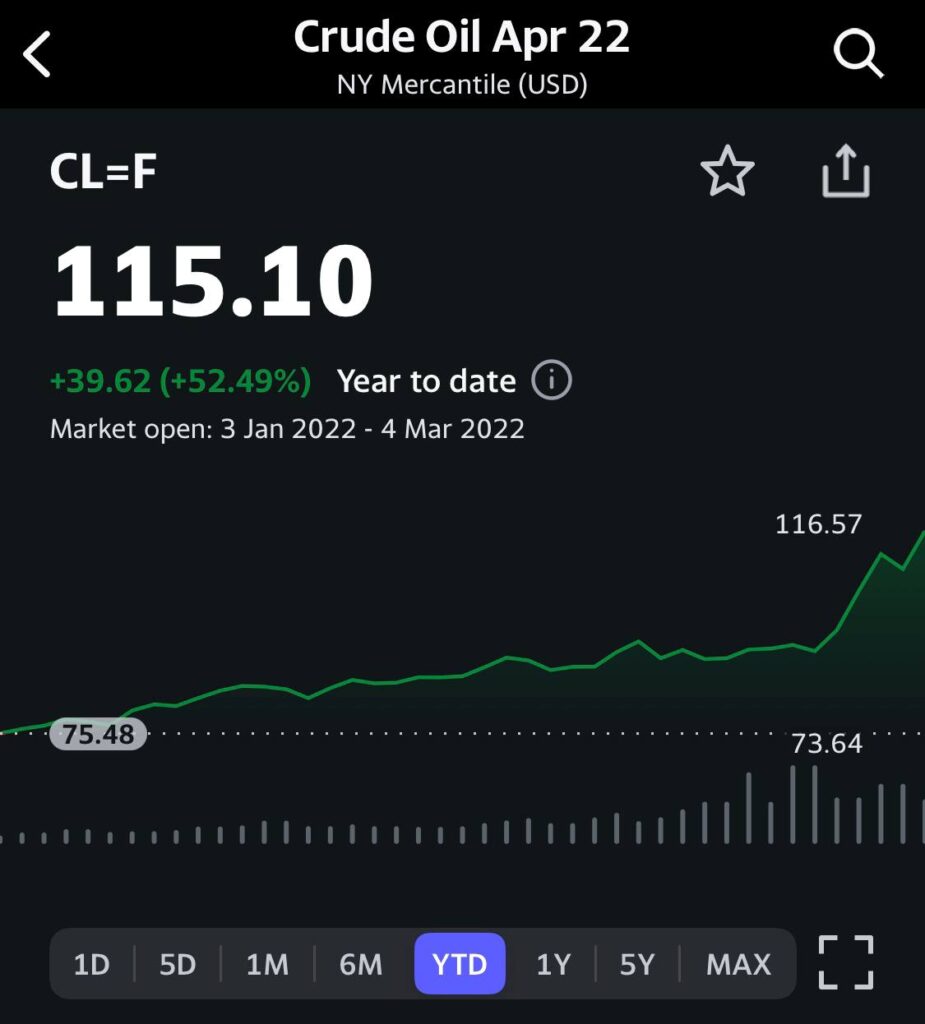
Firstly, there’s a number of energy sector funds listed in the US which are heavily weighted towards oil related companies like Exxon Mobil and BP, and will generally perform well as oil prices increase. For example, IXC – iShares Global Energy ETF, or VDE – Vanguard Energy ETF.
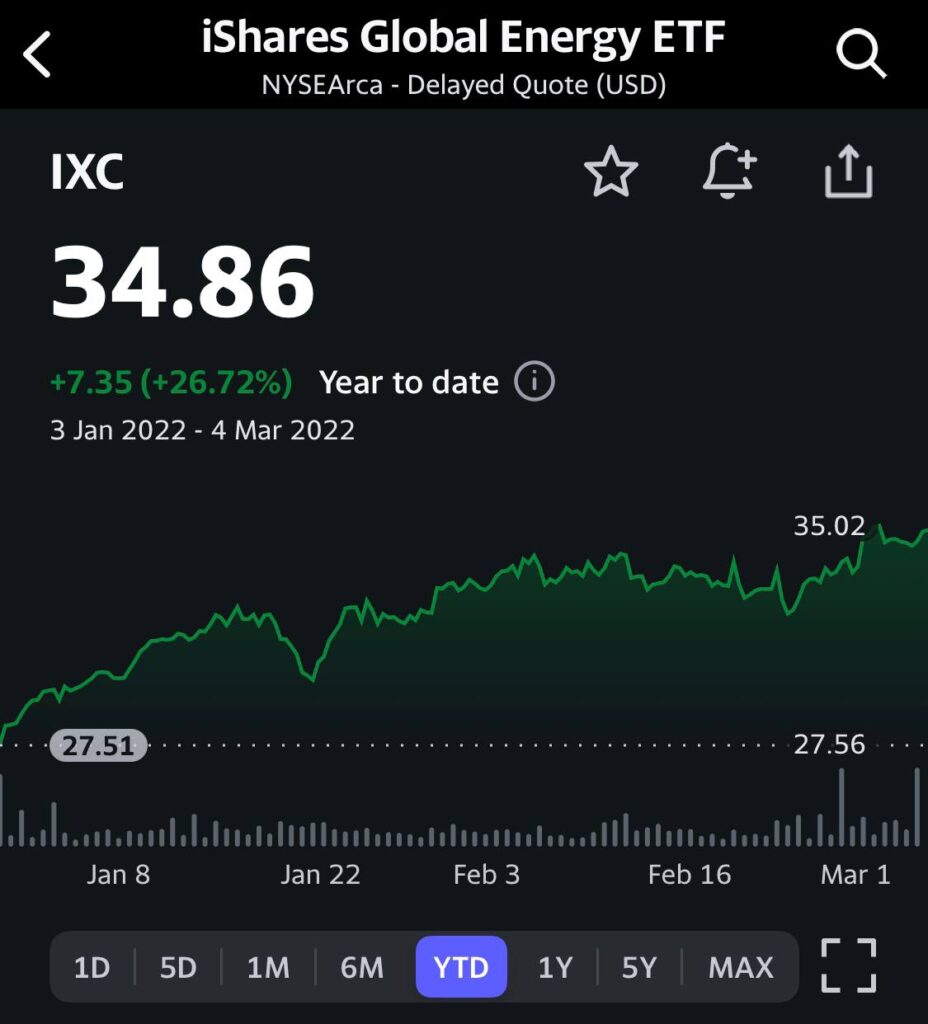
There’s also funds like USO – United States Oil Fund, which aims to track the price of West Texas Intermediate Light Sweet Crude Oil:
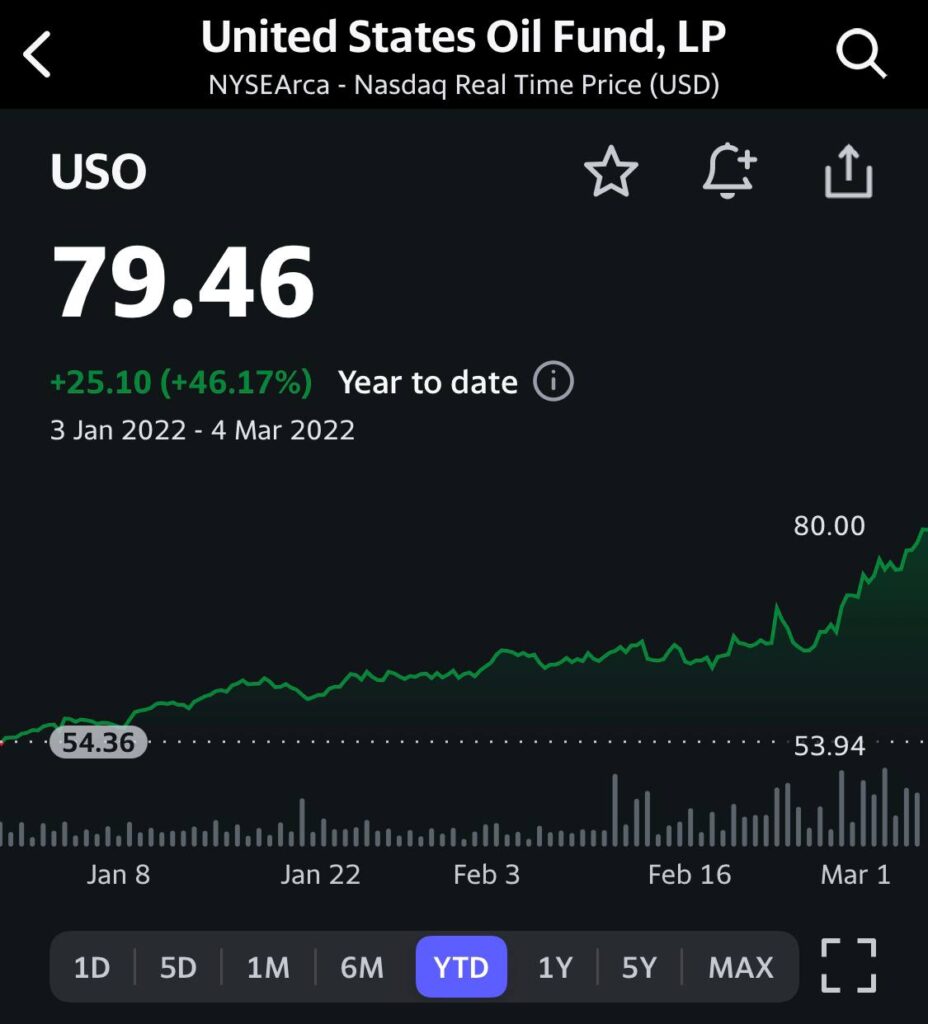
And UCO – Proshares Ultra Bloomberg Crude Oil ETF, a leveraged fund which aims to deliver 2x the daily performance of crude oil:
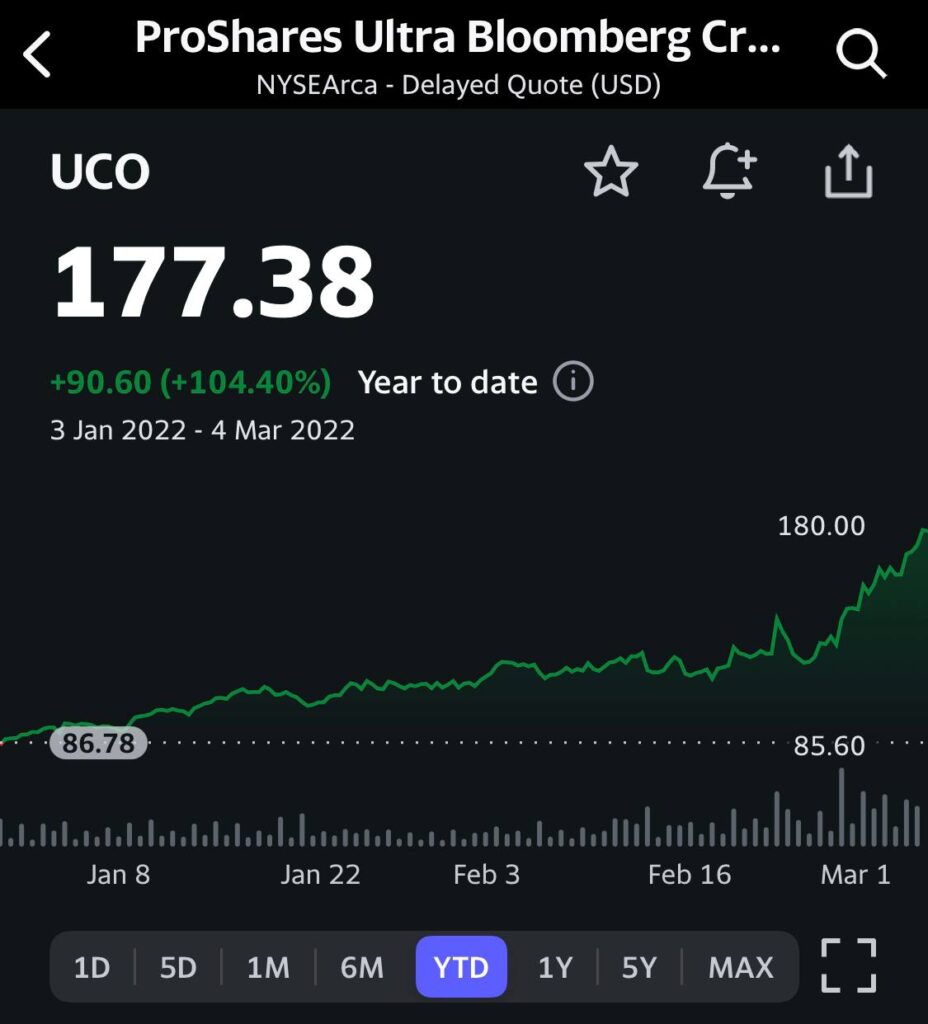
These aren’t recommendations to invest though – we have no idea where oil prices are going next. So please do you own research before investing.
10. Focussing on dividends in NZ – Spark, ANZ, Contact, what else?
New Zealand has no shortage of dividend paying companies, with the big 3 sectors for dividends in NZ being (with gross yields as at 4 March 2022 in brackets):
- Utilities – Contact (5.37%), Genesis (7.95%), Meridian (4.32%), Trustpower (7.30%), Mercury (4.04%), Vector (4.85%)
- Financials – ANZ (5.98%), Westpac (5.72%), Heartland (7.72%), NZX (5.93%)
- Real estate – Kiwi Property (6.35%), Stride (6.28%), Investore (5.08%), Precinct (4.13%), Argosy (4.93%), Property For Industry (3.65%), Goodman (2.80%)
There’s also Spark (7.40%), Turners (7.29%), Scales (5.44%), Briscoes (5.95%), and The Warehouse (13.45%) who pay relatively high dividends.
Lastly there’s the Smartshares NZ Dividend ETF (3.14%) which is a fund investing in the 25 highest dividend yielding companies in the NZX 50.
As always these aren’t recommendations, and the above yields aren’t guaranteed. There’s a lot more to consider when investing for dividends (like payout ratio and dividend sustainability), so do your own due diligence before investing.
Further Reading:
– Dealing with Dividends – 5 things to know about them
11. How many ETFs and companies should I hold as a 25 yo FT worker?
On one extreme you could hold just one fund. Assuming you’re a long-term investor this will usually be a Growth or Aggressive fund. These types of funds primarily invest in both local and international shares and are diversified enough that they could be the sole investment in your portfolio.
On the other extreme you could have a portfolio of 10s or 100s of funds and companies. But most investors will have a portfolio somewhere in the middle of those two extremes:
Our average customer holds between 4 and 5 funds, while one of our clients is in over 120 different funds!
InvestNow
Our stats round out to be similar—though it’s good to keep in mind that there’s no right or wrong amount to hold! 🙌
Sharesies
But there’s no right or wrong answer here. The number of funds or companies you should own depends on your personal preferences and finding out what works best for you. The more important thing is to be diversified (but not over-diversified), and invest in things that align with your financial goals.
Further Reading:
– 6 ways to build a long-term investment portfolio in New Zealand
12. Is it better to invest into 1-2 index fund managers or spread it amongst 3-4 fund managers/platforms?
It’s perfectly fine to use just one fund manager or platform for all your investing needs:
- From a portfolio diversification perspective – Most fund managers offer a good variety of funds (e.g. NZ shares, international shares, bonds, thematic funds), which are enough to put together a well-diversified portfolio.
- From a ‘what if the fund manager goes bust’ perspective – Their custodial arrangements protect your money if the manager/platform were to go bust, so the risk that comes with putting all your money on one platform is minimal.
But there’s nothing at all wrong with using multiple platforms either. Just watch out for:
- Duplication of fees – Some fund managers/platforms charge fixed account fees. You could end up paying multiple sets of account fees if you use multiple platforms.
- Higher brokerage – Brokerage fees are often cheaper when you invest larger amounts of money. If you invest through multiple platforms, you could end up spreading your money thinly and paying higher brokerage.
- Overlapping funds – Two funds offered by two different fund managers can often be similar and offer little additional diversification. For example, the Smartshares S&P/NZX 50 ETF and Kernel NZ 20 Fund are very similar in what companies and industries they invest in.
- More complexity – By using more platforms you might end up needing more effort to track your investments and get the information you need to do your taxes.
Further Reading:
– What happens to your money if InvestNow or Sharesies go bust?
13. What NZ funds have exposure to Russia? The only one I found is EMF from Smartshares, which has 3.3%
Great question, as there’s definitely a lot of interest in this at the moment. Let’s start by looking at index funds:
Index funds
Being an “Emerging Market”, Russian investments feature in a number of emerging markets and total world type index funds. We’ve put the approximate weighting each fund has to Russia in brackets where we could find them – in all cases these funds have low exposure to the country:
- As mentioned, the Smartshares Emerging Market ETF (~2.9% Russia)
- Smartshares Emerging Markets Equities ESG ETF
- Smartshares Total World ETF (~0.3% Russia)
- Smartshares Total World (NZD Hedged) ETF (~0.3% Russia)
- Smartshares Global Aggregate Bond ETF
- SuperLife Overseas Non-government Bonds Fund (~0.4% Russian bonds)
- 14 SuperLife funds that mirror or contain the above funds
- AMP All Country Global Shares Index Fund
- Simplicity’s Conservative, Balanced, and Growth funds. Very small amounts invested in Russian bonds through their international fixed interest allocation.
Russia is constituent country of the indices these funds track, so the funds are forced to hold Russian investments. However, the major index providers (S&P, MSCI, FTSE) are starting to remove Russia (and Russian ADRs) from their indices, so as a result Russian shares will very soon start dropping out of the above index funds. It’s not surprising given the current situation and the fact that trading on the Moscow Exchange has been halted since the 25th of February, making Russian shares uninvestable. It hasn’t yet been confirmed whether Russian bonds will be removed from indices.
Actively managed funds
Ethical investing research firm Mindful Money has put together a great resource showing a list of funds that have Russian investments. This includes actively managed funds from the following providers:
- AMP
- Russell
- Booster
- Fisher Funds
- Mercer
You can see a full list of funds with Russian investments on Mindful Money’s website. There’s a few fund managers (including ANZ, ASB, BNZ, Kiwi Wealth, and Westpac) who held Russian investments but have already divested (or intend to divest) from them. Other fund managers have no obligation to follow, but it seems likely given the shape Russia’s market is in.
Conclusion
Thanks to all who put a question through for this article. This is our first Q&A article, so it’s a bit different having our followers drive what we write about. As always keen to hear your feedback on what type of content you want to see next, otherwise keep an eye on our Facebook/Instagram/Twitter for any future Q&As.
Follow Money King NZ
Join over 7,500 subscribers for more investing content:
Disclaimer
The content of this article is based on Money King NZ’s opinion and should not be considered financial advice. The information should never be used without first assessing your own personal and financial situation, and conducting your own research. You may wish to consult with an authorised financial adviser before making any investment decisions.